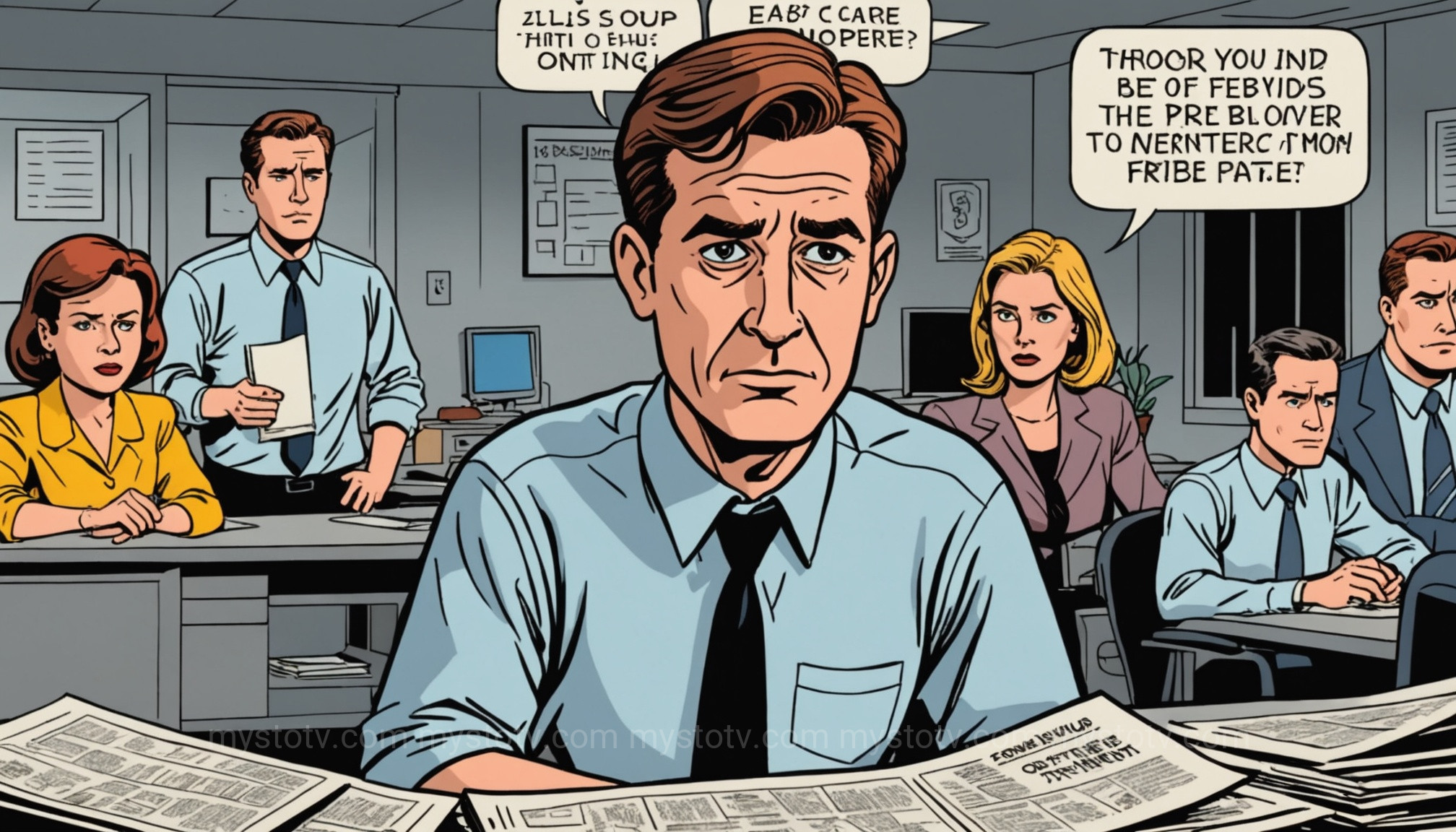Contents
- 1 What is Gaslighting at Work? Unmasking the Subtle Manipulation
- 2 Real Stories of Gaslighting at Work: "Am I Going Crazy?"
- 3 The Telltale Signs: How to Recognize Gaslighting at Work
- 4 The Damaging Impact: More Than Just a Bad Day with Gaslighting at Work
- 5 Taking Back Control: Strategies for Dealing with Gaslighting at Work
- 6 FAQ: Navigating the Complexities of Gaslighting at Work
- 7 References
- 8 Conclusion: Reclaiming Your Professional Sanity
What is Gaslighting at Work? Unmasking the Subtle Manipulation
The term "gaslighting" originates from the 1938 play and subsequent 1944 film Gaslight, where a husband manipulates his wife into believing she's going insane. In a professional context, gaslighting at work is a persistent form of psychological abuse where a person—often a superior—intentionally makes a colleague or subordinate question their own perceptions, memory, or sanity. It's a covert and insidious tactic designed to gain power and control.
It's crucial to distinguish gaslighting from simple disagreements, constructive criticism, or even poor management. A manager who gives direct, albeit tough, feedback is not a gaslighter. A boss who makes an honest mistake and forgets a detail is not necessarily gaslighting. The key difference lies in the intent and the pattern. Gaslighting is a deliberate, repeated strategy of distortion and denial. The goal is to destabilize you, making you feel incompetent, overly emotional, or "crazy," which in turn makes you easier to control and less likely to challenge the manipulator's authority.
This form of workplace manipulation works by slowly chipping away at your sense of reality. The gaslighter creates a narrative where they are always right, and you are always wrong, confused, or unreliable. Over time, the victim begins to internalize this narrative, leading to a dangerous cycle of self-doubt and dependence on the abuser for their version of "the truth."
Real Stories of Gaslighting at Work: "Am I Going Crazy?"
Abstract definitions can only go so far. The true nature of gaslighting at work is best understood through the real, painful experiences of those who have endured it. Here are some anonymized stories that illustrate how this manipulation plays out.
The Case of the "Disappearing" Instructions and Gaslighting at Work
Sarah, a marketing coordinator, was tasked with launching a new ad campaign. Her boss, David, gave her a verbal go-ahead on a specific budget and creative direction during their weekly check-in. The campaign launched, but the initial results were below expectations. In a team meeting, the department head questioned the strategy. David immediately said, "I'm not sure why Sarah went in that direction. My instructions were to use the alternate creative, which we discussed."
When Sarah later spoke to David privately, showing her notes from their meeting, he looked at them dismissively. "You must have misunderstood me," he said coolly. "I was very clear. Maybe you weren't listening properly." Over the next few months, this pattern repeated. Verbal instructions would be denied, crucial details would be "forgotten" in emails, and Sarah was constantly made to feel like she was incompetent and forgetful. She began to obsessively document everything, living in constant fear of being framed for another "mistake."
Analysis: This is a classic gaslighting technique. By denying his own words and blaming Sarah's "misunderstanding," David shifts all responsibility, protects his own image, and systematically erodes Sarah's confidence in her own memory and competence. The experience of repeated gaslighting at work forced her into a state of hyper-vigilance.
The "You're Too Sensitive" Tactic in Workplace Gaslighting

Jamal was a graphic designer whose boss, Karen, often made passive-aggressive comments about his work in front of others. She would say things like, "Oh, that's an... interesting color choice," with a slight smirk. During a critique, she once referred to his design as "a bit pedestrian." When Jamal professionally addressed this in a one-on-one, stating that he found the public comments unhelpful and demoralizing, Karen feigned surprise.
"Oh, Jamal, you can't be serious," she laughed. "I was just joking! You're being way too sensitive. You need to develop a thicker skin if you want to make it in this industry." She then told another colleague that Jamal was "having a hard time taking feedback." He started to believe her, wondering if he was indeed too thin-skinned and unable to handle the pressures of the creative world.
Analysis: This tactic invalidates the victim's legitimate feelings. By framing a reasonable emotional response as an overreaction, the gaslighter avoids accountability for their behavior. Labeling someone as "too sensitive" is a powerful tool in gaslighting at work because it reframes the victim's valid feelings as a personal flaw.
The Telltale Signs: How to Recognize Gaslighting at Work

Gaslighters rely on the subtlety of their methods. Their actions, taken in isolation, might seem minor. But when they form a consistent pattern, the red flags of manipulation become clear. Recognizing these signs is the first step to breaking the cycle of gaslighting at work.
Constant Questioning of Your Memory and Perception during Gaslighting at Work
This is the cornerstone of gaslighting. The manipulator will flatly deny things they said or did, even with evidence to the contrary. You'll hear phrases that are designed to make you doubt your own mind:
- "I never said that."
- "You're imagining things."
- "That's not how it happened at all. You're remembering it wrong."
- "You must have dreamt that."
The goal is to destabilize your reality. If they can make you believe your memory is faulty, they can control the narrative of any situation.
Undermining Your Credibility with Others as a Form of Gaslighting at Work
A gaslighting boss often works to isolate you by poisoning your reputation. They might tell your colleagues or their own superiors that you are confused, emotionally unstable, or unreliable. "Just keep an eye on Alex, they seem a bit overwhelmed lately," or "I'm worried about Maria's ability to handle the pressure." This pre-emptively discredits you, so if you do try to speak up about the manipulation, others are already primed to see you as the problem.
Challenging Your Emotional Stability in Workplace Gaslighting
As seen in Jamal's story, a common tactic is to attack your emotional state. When you react to their manipulative behavior with frustration, hurt, or anger, they use your reaction as proof of your instability. They'll say:
- "You're being irrational."
- "Calm down, you're getting hysterical."
- "See? This is why I can't talk to you. You're too emotional."
This is a cruel twist: they provoke a reaction and then use that very reaction to "prove" their point that you are the unstable one. This is a deeply damaging form of gaslighting at work.
Withholding or Twisting Information as a Tool for Gaslighting at Work
Gaslighters maintain control by controlling the flow of information. They might "forget" to invite you to a crucial meeting, leave your name off an important email thread, or give you incomplete instructions for a task. When the project inevitably runs into trouble, they can then blame your lack of involvement or performance, all while feigning ignorance: "Oh, I'm so sorry, I thought you were on the invite!" This keeps you perpetually on the back foot and reinforces the idea that you are not on top of your responsibilities.
The Damaging Impact: More Than Just a Bad Day with Gaslighting at Work
The effects of sustained gaslighting at work extend far beyond the office walls. This form of psychological abuse can have severe, long-lasting consequences for an individual's mental, emotional, and even physical health. It's not just "workplace drama"; it's a serious threat to your well-being.
Psychological and Emotional Toll
The most immediate impact is on your mental health. Victims of gaslighting often experience:
- Crippling Self-Doubt: You begin to second-guess every decision, conversation, and memory.
- Anxiety and Depression: The constant stress and confusion can lead to clinical anxiety, panic attacks, and depression.
- Imposter Syndrome: You feel like a fraud who is about to be discovered, even if you have a long history of success.
- Loss of Self-Esteem: The constant criticism and invalidation convince you that you are worthless and incompetent.
Professional Stagnation and Career Damage
Gaslighting at work directly sabotages your career. The constant fear of making a mistake can lead to analysis paralysis, causing you to avoid taking risks or showing initiative. Your performance may genuinely suffer due to the stress and confusion, leading to poor reviews. This creates a self-fulfilling prophecy for the gaslighter, who can then point to your declining performance as "proof" of your incompetence, potentially costing you promotions, raises, or even your job.
Taking Back Control: Strategies for Dealing with Gaslighting at Work

While facing gaslighting at work is a disorienting and painful experience, it is possible to regain your footing and take back control. The key is to shift from a reactive state of confusion to a proactive state of clarity and self-preservation. Recognizing these telltale signs is the first step, and these strategies are the next.
Document Everything: Your Most Powerful Tool against Gaslighting at Work
Your memory is not the problem, but a gaslighter will try to convince you it is. Counter this by creating an objective record. Keep a private, dated log of incidents on a personal device, not a work computer. Note the date, time, location, what was said or done, and who was present. Save relevant emails, text messages, and project files. When your boss denies a verbal instruction, follow up with an email: "Hi [Boss's Name], just to confirm our conversation, I will be proceeding with X, Y, and Z as we discussed. Please let me know if I've misunderstood anything." This creates a paper trail and moves communication from the deniable verbal realm to the verifiable written one.
Seek External Validation: Reconnecting with Reality from Workplace Gaslighting
Gaslighting thrives in isolation. To break its spell, you must connect with people outside the manipulator's sphere of influence. Talk to a trusted friend, family member, or partner. Explain what's happening and listen to their perspective. Often, an outsider can immediately see the manipulation you've been conditioned to doubt. Speaking with a therapist or counselor can be particularly powerful, as they are trained to recognize patterns of psychological abuse and can provide professional coping strategies. Their validation can be a lifeline back to your own reality.
Set and Enforce Boundaries
You do not have to engage in a gaslighter's reality-bending arguments. You can set boundaries without being confrontational. Instead of arguing about "what really happened," use firm, non-emotional statements that center your own perception.
- Instead of "You said to do it this way!" try, "My understanding from our conversation was to do it this way."
- Instead of "You're lying," try, "I recall that event differently."
- If they call you "too sensitive," you can say, "My feelings are my own, and I find that comment unhelpful."
The goal is not to convince them but to state your reality and disengage from their manipulative games.
Know Your Options: When to Escalate or Exit a Situation of Gaslighting at Work
Familiarize yourself with your company's HR policies on harassment and workplace conduct. If you have solid documentation, you may consider reporting the behavior. However, be prepared that HR's primary role is to protect the company. Sometimes, the most powerful step you can take for your mental health and career is to plan your exit. Update your resume, start networking, and look for a new role in a healthier environment. Leaving a toxic situation is not a sign of failure; it's an act of self-preservation and strength.
Here are answers to some common questions about dealing with this challenging workplace issue.
What's the difference between a tough boss and a gaslighting boss?
A tough but fair boss focuses on performance and accountability. They give direct, clear feedback (even if it's hard to hear), set high but consistent standards, and want you to succeed. A gaslighting boss focuses on power and control. Their "feedback" is often contradictory, personal, and designed to confuse and destabilize you. Their standards shift constantly, making success impossible. The core difference is intent: one aims to build you up through challenges, while the other aims to break you down through manipulation.
Can gaslighting at work be unintentional?
While the classic definition involves deliberate manipulation, some manipulative behaviors can stem from a person's deep-seated insecurities, narcissism, or poor communication skills without a consciously plotted campaign of gaslighting. For instance, a deeply insecure manager might consistently deny their mistakes to avoid looking bad, which has a gaslighting effect on their team. However, for the victim, the impact is the same regardless of intent. The focus should be on the pattern of behavior and its effect on you, rather than trying to diagnose the boss's intentions.
What if HR doesn't believe me or sides with the boss?
This is a difficult and unfortunately common reality. HR departments can sometimes be more concerned with mitigating legal risk for the company than with an individual employee's well-being, especially if the accused is a high-level manager. If you approach HR and feel you aren't being heard, or if the situation worsens, it's a strong signal that the organizational culture is unlikely to support you. At this point, your best options are to focus on self-preservation, continue documenting everything (in case you need it for legal reasons later), and accelerate your job search. Your well-being must be your top priority.
References
- DiGulio, Sarah. "How to know if you're being gaslighted at work — and what to do about it." NBC News, 22 Oct. 2018. https://www.nbcnews.com/better/health/how-know-if-you-re-being-gaslighted-work-what-do-ncna922831
- Gass, G. S., & Nichols, W. C. "Gaslighting: A Marital Syndrome." Contemporary Family Therapy, vol. 10, no. 1, 1988, pp. 3-16.
- Sarkis, Stephanie. "7 Signs of Gaslighting." Psychology Today, 22 Jan. 2017.
- Young, Stephanie. "How to Survive Gaslighting at Work." Harvard Business Review, 20 June 2022.
Conclusion: Reclaiming Your Professional Sanity
Confronting the reality of gaslighting at work is a challenging but empowering journey. It begins with trusting your gut feeling—that knot in your stomach, that persistent sense of confusion. By learning to identify the patterns of denial, manipulation, and emotional invalidation, you strip the gaslighter of their primary weapon: your self-doubt. Remember, you are not "crazy," "too sensitive," or "incompetent." You are a target of a subtle but damaging form of psychological abuse.
By documenting incidents, seeking external validation, setting firm boundaries, and knowing when to walk away, you can protect your mental health and reclaim your professional confidence. Your perception is valid, your feelings are legitimate, and you deserve a workplace where you are respected, not manipulated. Escaping the fog of gaslighting at work is not just about finding a new job; it's about finding your way back to yourself.